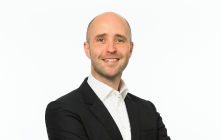
Lucion Group will be providing insights into managing market disruptors to leverage ESG and net zero opportunities during a panel discussion at Environment Analyst’s UK Business Summit on 30 November. Here, Lucion Group’s chief executive officer, Phil Rozier, offers a preview of his thoughts.
What are the most significant disruptors to the environmental and sustainability consulting market at the moment?
Phil Rozier: The skills shortage undoubtedly stands out as a pressing concern, compounded by two key factors. Firstly, the scarcity of qualified professionals able to support environmental services has intensified due to the rapid evolution of the market. Over the past 3-4 years demand has surged, significantly outstripping the availability of resources compared to historical trends.
Secondly, an interconnected issue exacerbates the skills shortage. The industry's fast-paced transformation has blurred the lines of service offerings, creating inconsistencies in meeting market expectations. While topics like ESG may appear well-understood on the surface, behind the scenes, they remain ambiguous. ESG, in its all-encompassing nature, often gets compartmentalised into specific areas of concern. While any attention to environmental matters is beneficial, this segmentation has led to varying customer expectations and challenges for service providers in discerning precise customer needs.
In contrast, more established services are typically driven by regulations, offering clear customer expectations and well-defined guidelines, qualifications, and expertise requirements from service suppliers. Without standardisation, there's a genuine risk of fluctuating quality and the need to revisit previously completed consultancy projects to meet compliance standards.
The investment realm, where I currently operate, also grapples with the absence of a set standard. This leads to varying investment strategies labelled as 'impact funds' or 'impact projects,' with inconsistent entry criteria across the industry.
While I am generally not in favour of excessive regulatory measures hindering development, I believe that many of the current challenges could be resolved through the establishment of agreed-upon standards across the marketplace. This would align expectations, development, training, and deployment, ultimately benefiting all stakeholders.
Do the disruptors you mention represent threats, opportunities, or both, to your business?
Phil Rozier: In the short term, these disruptors undeniably pose a significant threat, pending the achievement of equilibrium. While we can secure and complete projects successfully, there's a pervasive concern that both service providers and clients may have varying understandings of project delivery and requirements. However, in the long run, this presents a remarkable opportunity to standardise practices, fostering alignment between clients and service providers. This alignment is pivotal in achieving what we all aspire to master — sustainable and future-proofed environmental practices.
How are these disruptors affecting your ESG and net zero work or plans?
Phil Rozier: As a largely people business, our net zero plans are relatively straightforward. We already offset emissions that cannot be practically reduced, such as those stemming from our fleet, and we continuously assess our office footprint to improve emissions statistics. However, as a private equity-backed business consistently growing through acquisitions, the risk of inheriting businesses with higher emissions practices looms. Consequently, we scrutinise potential issues during the due diligence stage and devise strategies to address them effectively.
And how are you responding to them?
Phil Rozier: Our foremost priority is to gain an in-depth understanding of the business practices of potential acquisitions. A significant challenge lies in managing our supply chains, which encompass not only our existing suppliers but also those integrated through acquisitions. Frequently, our suppliers lag behind in adopting net-zero commitments, making it challenging to obtain the necessary emissions-related data.
Ideally, we should adopt a stance that compels us to seek alternative suppliers if our current ones cannot demonstrate their emissions position. However, even these alternatives often fall short in providing the required information.
EA: What ways could companies within the sector work together to maximise the opportunities from these disruptors?
Phil Rozier: Lucion is fortunate to have private equity backing from an ESG-conscious investor. We have access to a network of over 30 portfolio companies, all committed to adhering to best practices. We can share supply chains and leverage the benefits of a like-minded network. This approach, which has proven beneficial for Lucion, could be explored within the broader industry to expedite necessary changes and enhancements.
---
Phil Rozier, chief executive officer at Lucion Group
Appointed chief executive officer in May 2019, having joined Lucion in 2005, Phil is responsible for the overall strategic direction of Lucion Group, working closely with its private equity investors, Palatine Private Equity. Phil has more than 17 years' experience in the industry and has successfully led Lucion through an economic recession and global pandemic, whilst maintaining a successful organic and acquisitive growth strategy. Under his leadership in the last three years, the business has more than doubled, due to 12% organic growth and five acquisitions.
Hear more at the UK Business Summit on 30 November in London, where a panel of experts from Lucion Group, Control Risks and Monitor Deloitte will be discussing how to manage key market disruptors in order to leverage ESG and net zero opportunities.
